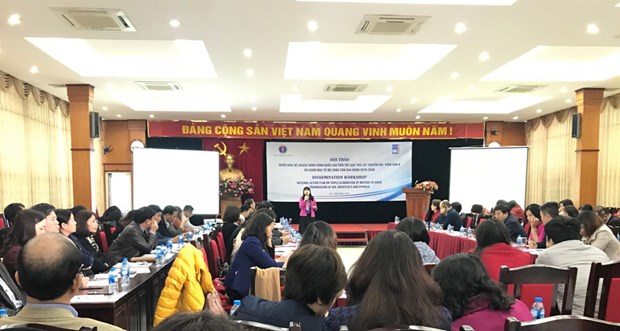 At the workshop (Photo: hanoimoi.com.vn)
At the workshop (Photo: hanoimoi.com.vn)January 8 to launch a national action plan on the eradication of
mother-to-child transmission of HIV, hepatitis B and syphilis in the 2018-2030.
The
country is striving to eliminate the mother-to-child transmission of HIV,
hepatitis B, and syphilis by 2030.
According
to the MoH’s , Vietnam has an average of
nearly 2 million pregnant women each year, with the HIV infection rate in
pregnant women standing at 0.19 percent. As a result, up to 1,520 babies are
born with HIV annually as without intervention, the mother-to-child
transmission rate could reach about 40 percent.
The
number of infants born with syphilis has also shown signs of increasing.
However, only less than 16 percent of expectant mothers take screening tests
for syphilis.
Meanwhile,
the rate of hepatitis B infection in pregnant women in Vietnam is relatively
high, ranging from 9.5 percent to 13 percent. Hence, women are advised to take
a test for the hepatitis B virus before pregnancy and re-take the test when
they are expecting if necessary.
Participants
at the workshop also shared experiences from other countries in efforts to end the
mother-to-child transmission of HIV, hepatitis B, and syphilis, as well as
devised a process to carry out the national action plan in localities and
proposed activities for the time ahead.
Statistics
from the World Health Organisation (WHO) showed that in the Western Pacific
region, about 180,000 children are infected with the hepatitis B virus annually,
while 13,000 and 1,400 others are diagnosed with syphilis and HIV infections,
respectively.
The
WHO Western Pacific Region have devised a planning framework to eliminate
mother-to-child transmission of HIV, hepatitis B, and syphilis in the 2018-2030
period, part of a bid to contribute to the implementation of the Sustainable
Development Goals and the Global Strategy for Women’s, Children’s, and
Adolescents’ Health 2016-2030. In addition, the WHO advised members to build
respective s on the triple elimination of those diseases in
2030.–VNA
Source: VietnamPlus
